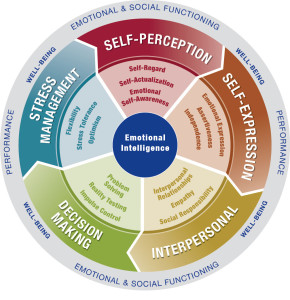Emotional Quotient (EQ) or Emotional Intelligence is a measure of your ability to process emotions, communicate, and relate with others. But what does it REALLY tell you, and how can you use what you learn about your EQ to help you become a better leader?
Most standard EQ tests, like the EQi 2.0 used by Kandidata, are broken down into specific emotional composites. These sections are based on specific emotional attributes and abilities. Each affords the test taker some insight into where strengths and weaknesses lie, and how what they can do to improve their leadership abilities. In this article, we’ll go over the six main sections, explain what they are, and briefly look into how they can be leveraged into improved leadership.
1. Self-Perception Composite
The first section on many EQ reports is a composite score that ranks your self-perception. A good lay-term way of thinking about it is that the Self-Perception Composite measures your self-esteem. It measures how well you regard yourself, but also how motivated you may be, and how aware you are of your own emotions and needs.
High self-perception is critical in a leader. Many of the least desirable and most disruptive traits found in bad leaders stem from low self-perception. Things like low confidence, laziness, an inability to understand your own emotions – these all tend to be projected outward in a poor leader as negative behaviors. Leaders with low confidence, for example, may have difficulty with being questioned or contradicted. Poor motivation makes for distant and uninvolved leaders. Poor self-awareness leads to managers who lash out because they have difficulty understanding their frustrations, etc.
2. Self-Expression Composite
The self-expression composite measures how well you are able to explain yourself and your feelings to those around you. Once you understand what you’re feeling, how effective are you at communicating that to your subordinates and managers?
A low self-expression can also severely reduce your effectiveness as a manager. Self-expression is broken down into three parts: emotional expression, assertiveness, and independence. We’ve already talked about the pitfalls of low emotional expression here
3. Interpersonal Composite
The interpersonal Composite tells you how well you relate to and understand the people around you. It is, in effect, the self-perception composite, but looking outward.
We’ve talked quite a bit already about the importance of empathy [link to empathy article] and the ability to understand and relate to the emotions of others. Other aspects of the interpersonal composite include your ability to have meaningful relationships with others, and social responsibility – the ability to understand where you fit into the social dynamic.
4. Decision Making Composite
The decision making composite is pretty self-explanatory. It measures your ability to make sound, rational decisions that lead to positive results.
The decision making composite is broken down into three sections. The first is problem solving, which measures your ability to parse your own emotions and those of others to find solutions to problems. Part of being a great leader is managing the interpersonal relationships of your team, which makes this skill mandatory. The second component is reality testing – it deals with the ability of an individual to separate the way they feel from the way they perceive situations, and to then filter out an objective truth. Finally, there is impulse control, or the ability to delay gratification and work towards longer term goals.
5. Stress Management Composite
The stress management composite measures your ability to deal with sudden upheavals and your resiliency to change. A great leader has to be able to stay cool under pressure, and be able to react calmly to a crisis, making this section of incredible value.
The first component of the stress management composite is flexibility – the ability to change or adapt your emotions to changing circumstances around you. The second component is stress tolerance. Stress is by far the biggest reported cause of burning out or underperforming, so being able to deal with it in a healthy and effective manner is a must-have. The last section is optimism, which measures your ability to stay positive and upbeat in the face of hardship.
How Can You Use These Emotional Quotient Factors To Be A Better Leader?
On the surface, it seems that a lot of these factors are pretty self explanatory. Everyone knows a great leader has to be empathetic, be able to deal with stress, capable of evaluating situations objectively, etc. The difficulty is that a lot of the specific ACTIONS that turn someone from a great leader to a merely ok leader have very complex causes. Did you shout at that employee because you were over-stressed or because you had a fight with a loved one last night? Is the project late because you have difficulty enforcing timelines or because you focus on short-term bells and whistles instead of long-term goals?
Getting your emotional quotient professionally evaluated allows you to pinpoint the specific interactions of your character that lead to these negative actions. This, in turn, allows you to create a specific action plan to address the actual issues, rather than just covering up the symptoms.
That, in fact, is the secret that makes emotional quotient testing so powerful – it helps identify root causes. And since emotional intelligence is a learned skill, once you know the root causes, you can get better. THAT is the power of understanding your emotional quotient – it lets you become a great leader, rather than just acting like one.

